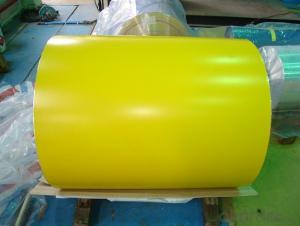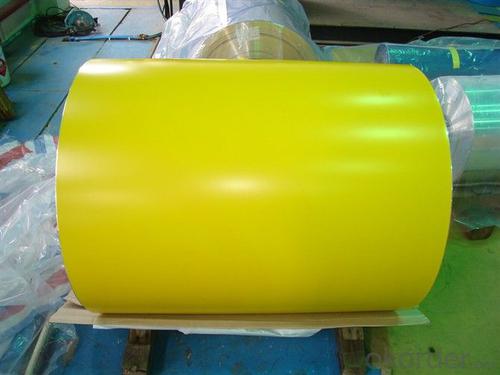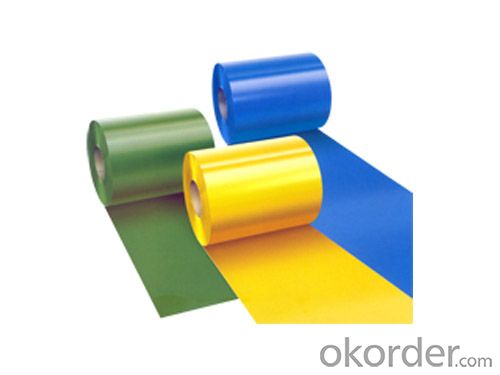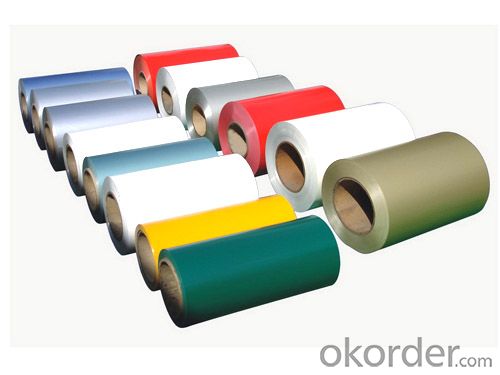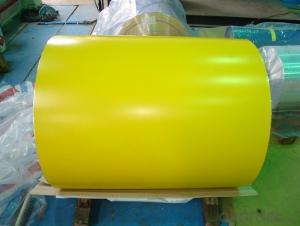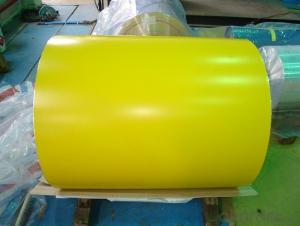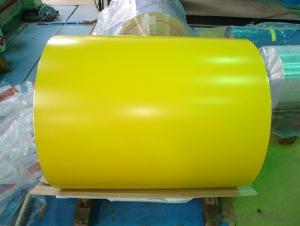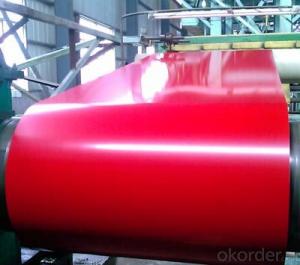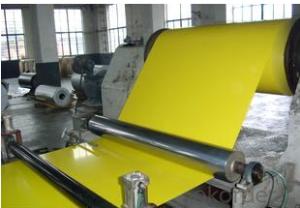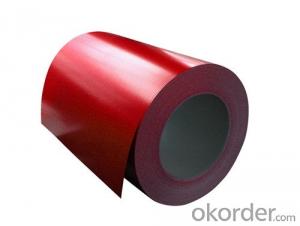Pre-Painted Galvanized/Aluzinc Steel Sheet in Coils with good quality in yellow Color
- Loading Port:
- Shanghai
- Payment Terms:
- TT OR LC
- Min Order Qty:
- 100 m.t.
- Supply Capability:
- 10000 m.t./month
OKorder Service Pledge
OKorder Financial Service
You Might Also Like
1. Pre-Painted Galvanized/Aluzinc Steel Coil Description:
With GI as base material, after pretreatment (degrease and chemical treatment ) and liquid dope with several layers of color, then after firing and cooling, finally the plate steel is called pre-painted galvanized (aluzinc) steel. Pre-painted galvanized steel is good capable of decoration, molding, corrosion resistance. It generally displays superior workability, durability and weather resistance.
2.Main Features of the Pre-Painted Galvanized/Aluzinc Steel Coil:
• Excellent process capability
• Smooth and flat surface
• Workability, durability
• Excellent heat resistance performance
• High strength
• Good formability
• Good visual effect
3.Pre-Painted Galvanized/Aluzinc Steel Coil Images
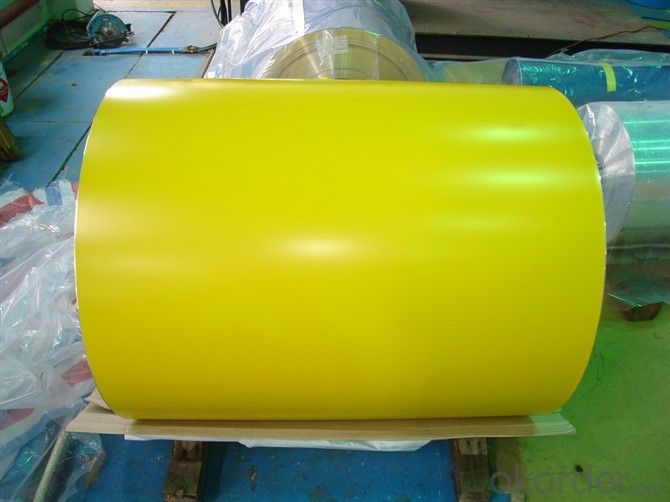
4.Pre-Painted Galvanized/Aluzinc Steel Coil Specification
Standard: AISI, ASTM, BS, DIN, GB, JIS
Grade: DX51D, DX52D
Thickness: 0.17-2.0mm
Brand Name: KMRLON
Model Number: coil
Type: Steel Coil
Technique: Cold Rolled
Surface Treatment: Coated
Application: Boiler Plate
Special Use: High-strength Steel Plate
Width: 20-1250mm
Length: customized
commoidty: pre-painted galvanized steel coil
Thickness: 0.13-4.0mm
width: 20-1250mm
zinc coating: 40-180g/m2
printing thickness: top side: 20+/-5 microns, back side: 5-7 microns
color: YELLOW color
surface treatment: color coated
coil weight: 4-7 tons
coil ID: 508/610mm
packaging: standard seaworthy packing
5.FAQ of Pre-Painted Galvanized/Aluzinc Steel Coil
1. What’s the application of this product?
Roof, roof structure, surface sheet of balcony, frame of window, etc.
2. What’s the brand of the paint?
We use the best brand of all of the word—AKZO.
3. How about your company?
A world class manufacturer & supplier of castings forging in carbon steel and alloy steel,is one of the large-scale professional investment casting production bases in China,consisting of both casting foundry forging and machining factory. Annually more than 8000 tons Precision casting and forging parts are exported to markets in Europe,America and Japan. OEM casting and forging service available according to customer’s requirements.
4. How to guarantee the quality of the products?
We have established the international advanced quality management system,every link from raw material to final product we have strict quality test;We resolutely put an end to unqualified products flowing into the market. At the same time, we will provide necessary follow-up service assurance.
5. How long can we receive the product after purchase?
Usually within thirty working days after receiving buyer’s advance payment or LC. We will arrange the factory manufacturing as soon as possible. The cargo readiness usually takes 15-25 days, but the shipment will depend on the vessel situation.
- Q: What are the different coil packaging methods used for steel coils?
- There are several different coil packaging methods used for steel coils. These include wrapping the coils with stretch film or shrink wrap, using steel or wooden strapping to secure the coils, placing the coils inside wooden crates or metal frames, or using specialized coil packaging machines that can automatically wrap and secure the coils. Each method has its advantages and is chosen based on factors such as the size and weight of the coils, transportation requirements, and protection needed during storage or shipping.
- Q: Aluminum and Steel brittle or ductile based on these results? and why? Steel Aluminium% Elongation 0.2510.2705Modulus of E in ksi11833.33964.71Tensile Strength (ksi)87.5 51.5Yield Strength (ksi)78.5 41
- Only steel(of this pair)might be liable to brittle fracture,which would be implied by almost zero elongation or reduction in area at fracture.On this basis the steel has not failed by brittle fracture.I would expect much more elongation in pure aluminium than your sample shows so I presume it to be brittle unless it is an alloy rather than commercially pure aluminium.However brittle fracture in metals is a particular phenomenon to be determined by impact tests and examination of fracture surfaces and is particularly relevant to metals with the body centred crystal structure.
- Q: Which one has more electrical resistivity? Wood or steel? And why?I know that the resistivity depends on the material of the conductor, but i want a perfect explaination please.Thnx in advance :)
- Wood, and it depends on the elements making up the 'conductor' .. and how 'mobile' electrons are in the material .. To a first approximation (non-exotic materials), if the elements form molecules where electrons are 'weakly bound', then that material will conduct electricity. The 'weaker' the binding (and the more electrons), the better the conductor .. (it is, of course, much more complicated than that .. see link)
- Q: How do steel coils contribute to the renewable energy sector?
- Steel coils contribute to the renewable energy sector by playing a crucial role in the manufacturing of wind turbines and solar panels. These coils are used to produce the structural components of wind turbine towers and solar panel support structures. Additionally, steel coils are also utilized in the construction of transmission lines and grid infrastructure for renewable energy projects, ensuring efficient distribution of electricity generated from renewable sources.
- Q: How are steel coils used in the production of roofing materials?
- Steel coils are used in the production of roofing materials by being fed into a roll-forming machine, which shapes the coils into the desired profile for the roofing panel. The coils are then cut to the appropriate length, coated with protective finishes, and formed into individual roofing panels that are ready to be installed on buildings.
- Q: How do steel coils contribute to durability and longevity in products?
- Steel coils contribute to durability and longevity in products due to their inherent strength and resistance to corrosion. By using steel coils as a material, products benefit from enhanced structural integrity and the ability to withstand heavy loads, mechanical stress, and harsh environmental conditions. The flexibility and resilience of steel coils also ensure that products can maintain their shape and functionality over a prolonged period, making them highly durable and long-lasting.
- Q: How are steel coils packaged for shipment?
- Steel coils are typically packaged for shipment by being tightly wrapped in protective materials such as plastic or steel strapping. They are then secured onto pallets or placed into steel crates, ensuring stability during transportation. The packaging helps to prevent damage, corrosion, and movement during handling and transit.
- Q: How are steel coils used in the manufacturing of steering columns?
- Steel coils are used in the manufacturing of steering columns as they provide strength and durability to the structure. The steel coils are typically formed into a cylindrical shape and then welded or joined together to create the main body of the steering column. This ensures that the steering column can withstand the forces and impacts experienced during vehicle operation, providing stability and control to the driver.
- Q: I have a job where I'm required to wear ANSI certified steel toed boots or shoes(so long as its ANSI). Thing is, I'm a vegan. I do NOT want to buy leather, and I will go to great lengths to buy a non leather shoe/boot I can wear on the job! I AM currently borrowing my dad's leather ANSI boots, but would very much love to be able to rock a pair of cruelty free boots/shoes on the job!It does not have to be certified vegan just all man-made materials and no leather/sued and other such stuff where animals have to die. It would make me no better than the massive slaughterhouse industries and such. Valueing money of ver live/morals. I don't want one of the first things I need to do in my manufacturing job is compromising my morals. :3So if you know of an ANSI vegan friendly boot brand PLEASE TELL ME! *gets on knees begging*Money isn't really an option for me, I'll just continue borrowing my dad's boots till I save up enough!Thanks in advance! :D
- This Site Might Help You. RE: Vegan ANSI Steel Toes? I have a job where I'm required to wear ANSI certified steel toed boots or shoes(so long as its ANSI). Thing is, I'm a vegan. I do NOT want to buy leather, and I will go to great lengths to buy a non leather shoe/boot I can wear on the job! I AM currently borrowing my dad's leather ANSI...
- Q: Does Steel Cut Oatmeal have the same health benefits as Old Fashioned Oatmeal? What is the difference in processing?
- I have read about steel cut oatmeal, and they say that has the benefit of the whole natural grain, so its more fiber that your getting for your digestion!
Send your message to us
Pre-Painted Galvanized/Aluzinc Steel Sheet in Coils with good quality in yellow Color
- Loading Port:
- Shanghai
- Payment Terms:
- TT OR LC
- Min Order Qty:
- 100 m.t.
- Supply Capability:
- 10000 m.t./month
OKorder Service Pledge
OKorder Financial Service
Similar products
Hot products
Hot Searches
Related keywords
